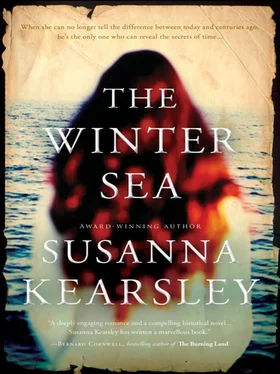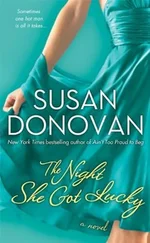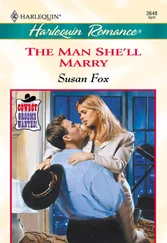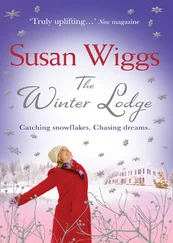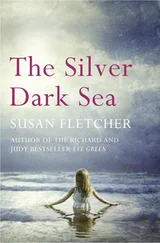Susanna Kearsley - The Winter Sea
Здесь есть возможность читать онлайн «Susanna Kearsley - The Winter Sea» весь текст электронной книги совершенно бесплатно (целиком полную версию без сокращений). В некоторых случаях можно слушать аудио, скачать через торрент в формате fb2 и присутствует краткое содержание. Год выпуска: 2008, ISBN: 2008, Жанр: Историческая проза, на английском языке. Описание произведения, (предисловие) а так же отзывы посетителей доступны на портале библиотеки ЛибКат.
- Название:The Winter Sea
- Автор:
- Жанр:
- Год:2008
- ISBN:9780749080976
- Рейтинг книги:3 / 5. Голосов: 1
-
Избранное:Добавить в избранное
- Отзывы:
-
Ваша оценка:
- 60
- 1
- 2
- 3
- 4
- 5
The Winter Sea: краткое содержание, описание и аннотация
Предлагаем к чтению аннотацию, описание, краткое содержание или предисловие (зависит от того, что написал сам автор книги «The Winter Sea»). Если вы не нашли необходимую информацию о книге — напишите в комментариях, мы постараемся отыскать её.
The Winter Sea — читать онлайн бесплатно полную книгу (весь текст) целиком
Ниже представлен текст книги, разбитый по страницам. Система сохранения места последней прочитанной страницы, позволяет с удобством читать онлайн бесплатно книгу «The Winter Sea», без необходимости каждый раз заново искать на чём Вы остановились. Поставьте закладку, и сможете в любой момент перейти на страницу, на которой закончили чтение.
Интервал:
Закладка:
‘Aye, it’s possible.’
It was a little more than that, I thought. And it was one of my regrets that, in the moment before Ross resumed our tour, I didn’t just step up and knock at that green door and ask the artist lad from Glasgow for a tour of his front rooms, and of the room in the far corner where the window seemed to watch me like a gently knowing eye.

I was restless that night.
I had wanted to treat Ross to supper, to thank him for taking me round, but he’d cheerfully waved off my offer. ‘No, no, there’s no need for that. The wife’s sister will be watching the door as it is, I’ve been gone so long. But,’ he’d said, ‘it was a pleasure, my dear, to have met you.’
Our handshake had easily turned to a hug.
‘Oh,’ he’d said, drawing back so he could search his coat pockets, ‘I nearly forgot. I was meaning to give you a catalogue.’
‘Catalogue?’
‘Aye, for the auction. I’ve sent one last week to your father, but I thought you might like to have one yourself. It’s the New York McClellands,’ he’d said. ‘Tom and Clare.’
‘Oh, yes.’ Tom was my Dad’s distant cousin, and traced his line back, as did we, to Sophia and David. Somehow or other his side of the family had managed to gain possession of most of the family’s historical keepsakes—our family Bible being the only notable exception—and Tom and his wife had a habit of blithely disposing of things to help fund their extravagant lifestyle, which left my dad fuming since often we didn’t find out until after the sale.
I’d looked at the catalogue cover to see what the date of the auction was—next Friday—and Ross had said, ‘Oh aye, I got that away in the post to your father as soon as I opened the envelope. Tom’s done this so many times now I’ve had to get one step ahead of him, so I set up an arrangement,’ he’d said, ‘with the auction house. Any time they take in something to do with McClellands, they send me their catalogues.’
‘Clever.’ I’d smiled. ‘I’m surprised Tom and Clare still have things left to sell. I’d have thought they’d cleared everything out by now.’
‘Oh, there’s not much this time. Only a table or two and some jewelry. But still, I thought you and your father would like to at least see the pictures.’
I’d thanked him, and tucked it away in my bag.
After supper, I’d gone for a walk and had sat for an hour on a bench at the back of the Greyfriars Church by the harbor. It wasn’t the kind of a harbor I’d thought it would be, after all that I’d read in the history books. Centuries ago the great Scottish patriot William Wallace had supposedly sailed from here after his failure at Falkirk, fleeing to the safety of the continent, and his arch-nemesis, the English King Edward I, had once landed his fleet of some sixty-odd ships in Kirkcudbright, so in my own mind I had pictured a harbor like those of the towns on the coast, but this hadn’t been like that. There had been little more than the river itself, with a wall at its edge where the boats could be moored. And at low tide those boats would be sitting on mudbanks, and anything larger would have to wait out in the river’s deep middle, at anchor.
But still, when I’d squinted, I hadn’t had trouble imagining ships sailing past, coming in from the sea to seek shelter and unload their cargoes. The town would have changed since that time. The power plant off to my right and the bridge arching over the bend in the river would not have been there, but when I’d filtered out all that, I’d felt I might be seeing what Sophia would have seen had she been sitting in that spot beneath the trees three hundred years ago, and looking out across the River Dee. The farther shore was still and peaceful, with its green hills rising gently through the deeper green of woods above a white farm and a small boat sailing past upon the tide.
I hadn’t been so certain of the church behind me—Ross had told me it had been rebuilt at some time in the eighteenth century, and was not the original—but I’d been sure the castle that stood even taller behind that was something that Sophia would have known. MacLellan’s Castle, named for my own family, though we hadn’t yet established any link on paper between our McClellands and the man who’d built the castle. It had suffered, as had Slains, the great indignity of having had its roof removed, and so had fallen into ruin. Even so, considering MacLellan’s Castle’s roof had been removed almost two hundred years before the one at Slains, it had seemed to be bearing up wonderfully well.
Ross had shown me around it as part of our tour, and we’d walked round the outside on tidy gravel pathways edged by neatly clipped sections of lawn and new-flowering borders so that he could show me the armorial engravings chiseled over the front doorway. I confess I’d paid little attention except to the fact that the arms had been those of the laird and his second wife, with whom he’d apparently been very happy, and that had started me thinking about second marriages.
And that, I knew, was at the core of my problem.
I needed Sophia to marry again as she’d done in real life, but I couldn’t see how she’d be happy with anyone other than John, and my fear was that once I got into the writing, I’d find that she hadn’t been happy—that she’d only married my ancestor for the security, or to get out of Kirkcudbright, or for some other practical reason. And once I had written the scene, I’d be stuck with it. I couldn’t change what had actually happened, not even to satisfy Jane’s desire for a happy ending.
It wouldn’t ring true.
That was why I was restlessly pacing my room now, unable to focus enough to just sit down and write.
I’d never had writer’s block, but sometimes when I was approaching a scene that I didn’t want to deal with I had trouble getting on with it, and pairing Sophia with David McClelland would be, in some ways, even harder than killing off Moray. My subconscious sensed what was coming and shrank from the task, finding any excuse not to work.
A part of me wanted to just pull the plug on my laptop and go straight to bed and forget the whole thing, and I might have, except at that moment Sophia’s voice started to form in my mind, her words faint but insistent.
She’d said them before, when she’d spoken to Kirsty before leaving Slains. And though, when she had said them, she’d been speaking of her childhood, I believed that in this room, here in this place, her words meant more than that. I felt them like a nudge at my shoulder, encouraging me to go on.
I did not suffer in Kirkcudbright , she reminded me .
And what else could I do, I thought, but take her at her word?
XXII
AFTER THE FIRST MONTH Sophia had stopped trying to keep track of days, they were so much alike—all filled with prayer and quiet work and sober conversation. Only Sundays stood out from the rest, for she had found them quite exhausting when she’d first arrived among the Presbyterians: up early and to prayers, and then to kirk at ten, and briefly home to eat a meager meal of bread and egg before returning to the kirk at two, and sitting through the sermons all the afternoon, by which time she was far too tired to enjoy the supper that was served at night, or take full part in all the evening prayers and singing that were yet to follow before she could take herself upstairs to bed.
The Countess of Erroll, while a woman of devotion, had kept Sundays in the manner of a true Episcopalian—a morning service followed by a midday meal that made the table groan and had left everyone quite lazy and content to spend the leavings of the day in happy idleness.
Читать дальшеИнтервал:
Закладка:
Похожие книги на «The Winter Sea»
Представляем Вашему вниманию похожие книги на «The Winter Sea» списком для выбора. Мы отобрали схожую по названию и смыслу литературу в надежде предоставить читателям больше вариантов отыскать новые, интересные, ещё непрочитанные произведения.
Обсуждение, отзывы о книге «The Winter Sea» и просто собственные мнения читателей. Оставьте ваши комментарии, напишите, что Вы думаете о произведении, его смысле или главных героях. Укажите что конкретно понравилось, а что нет, и почему Вы так считаете.
